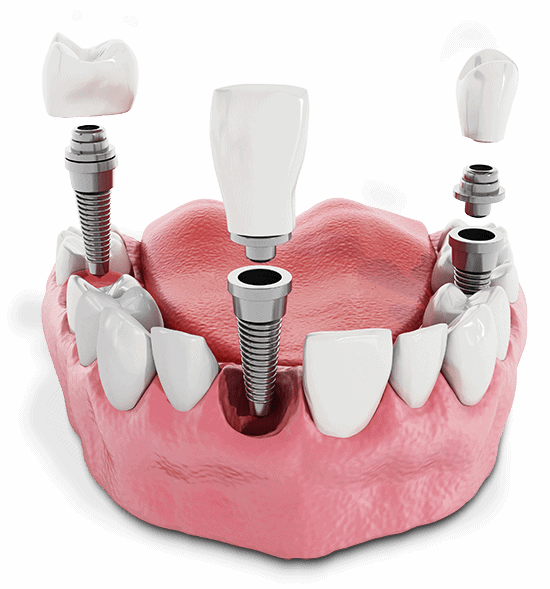Surgical Extraction
Surgical extractions are sometimes a dental reality. Though we all want to avoid them as much as possible, we sometimes reach a point where keeping a tooth will impair oral health and even affect surrounding teeth. 1FD Implant Centers understands the subject of surgical extraction can be unpleasant, which is why we are going to discuss them in detail and how we prioritize your comfort during this time.

Surgical Extraction and Dental Implants
When you think about impacted teeth and surgical extractions, your mind probably goes to wisdom teeth, which are the most common type of extraction. However, extractions are more common than you may think and can be performed on any tooth that is impacted, not just wisdom teeth.
When a tooth is impacted, it is fully below the gumline and requires cutting into the gums to remove it. This includes teeth that need to be removed before a dental implant can be placed. In these cases, a surgical extraction is the first step in the dental implant process and is required if the tooth has not already come out on its own.
Surgical extraction is a more involved process than having a tooth pulled in a dentist’s office. It is typically performed by an oral surgeon with the patient under general anesthesia or IV sedation.
Your convenience matters to us at 1st Family Dental, which is why we offer extraction services in our office, so there’s no need to go to a separate oral surgeon.
Are You A Candidate For Dental Implants
Extraction Recovery and Next Steps
Similar to surgery on any other part of the body, there is usually some recovery time involved. However, it won’t take long before you are back to normal and ready to get back to work or your daily routine. A follow-up appointment is typically needed to ensure that you are healing properly after the surgery.
If more than one tooth is being extracted, we will try to do everything at once to minimize discomfort after the surgery and to ensure that you are ready to move on to the next step in the implant process.
Once the extraction is complete, you may need to bone grafting for your jaw to ensure that it’s strong enough to support your new implants. Otherwise, you should be ready for the implants within a few weeks of the extraction.
The sooner you get started with the surgical extraction, the sooner you can get your implants installed and show off your beautifully restored smile. Need an emergency tooth extraction Chicago? Call us now!

What Can I Expect with a Surgical Extraction?
Since surgical extractions involve oral surgery, there is a recovery period. Therefore, it is similar to other types of surgeries. The good news is that many of our patients rebound quite quickly and are able to resume their daily activities soon. It is standard practice for 1FD Implant Centers to schedule a follow-up appointment after surgery to make sure that your mouth is healing properly.
1FD Implant Centers take pride on not only providing customized care but also comfortable care. We take great precautions to minimize pain and discomfort, both during and after your surgical extraction. Patients receiving dental implants may need bone grafting if there is sufficient bone loss. Bone grafting can help ensure the jaw is strong and can support dental implants. If no bone grafting is needed, patients are typically ready to receive their implants several weeks after their extraction.

Is a Surgical Extraction the Best Option For Me?
1FD Implant Centers will be happy to assess your oral health needs and decide if a surgical extraction is your best option. We are highly skilled at what we do, and we keep our patients’ health and well-being in mind each step of the way.
Find Out If You're A
Candidate For Dental Implants!

Answer The Following Questions To Learn More About Our Pricing & Financing Options

Why Should I Go to 1FD Implant Centers in Chicago and the Chicago suburbs?
1FD Implant Centers take a patient-oriented approach, complete with customized care and concierge-level service. We are not worried about if you have dental insurance; instead, we are only concerned with your best interests. If you are searching for personalized dental solutions and a first-class experience, we look forward to providing it!
We can help you find out if a surgical extraction is needed. Learn more today when you contact our team to schedule your complimentary implant consultation!